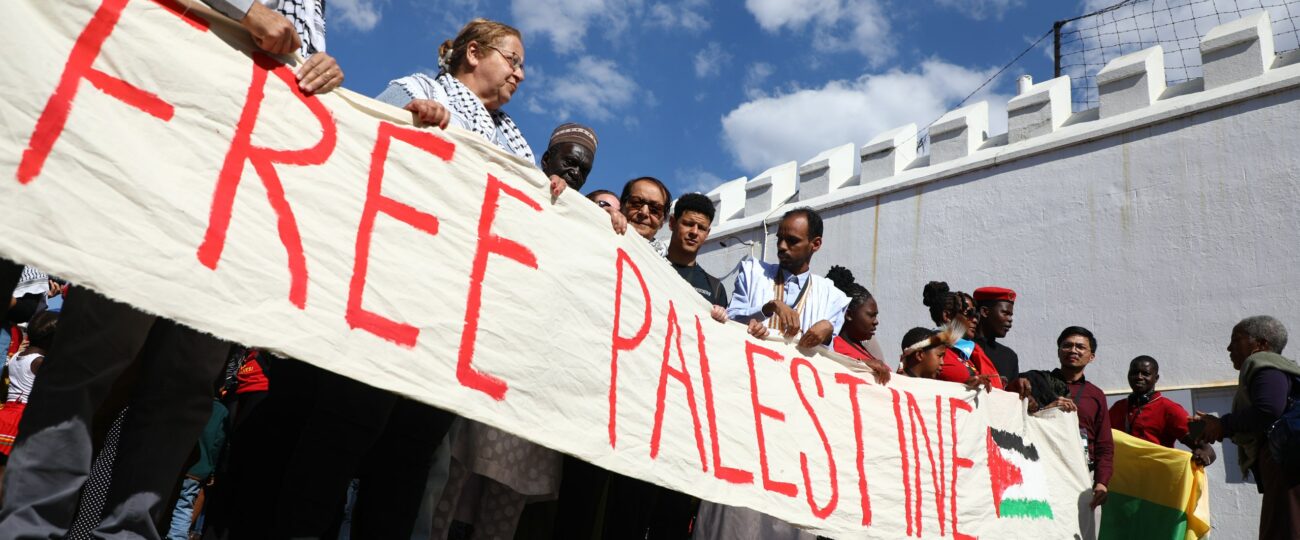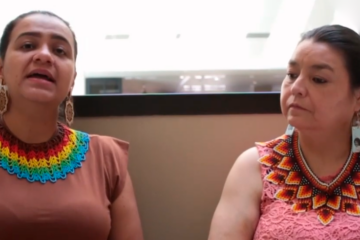Leila Khaled is a member of the Central Committee of the Popular Front for the Liberation of Palestine (PFLP), and a Palestinian living as a refugee for 75 years, now based in Jordan.
This interview was conducted collectively by the comms team of the Dilemmas of Humanity International Conference, organized by the International People’s Assembly, which took place in Johannesburg, South Africa, in October, 2023. During the conference, Leila Khaled spoke about her life and struggles in defending Palestine and its people, and denounced the land grabbing and violence conducted by Israel against the Palestinian people. Watch or listen to the full interview or read the interview below.
In the broader context of Palestinian resistance to Zionist occupation, are we seeing an historic intensification of resistance? What accounts for the unity that has been built between different groups that are historically divided and ideologically diverse?
First of all, we haven’t been divided since the revolution and the intifada that happened in 1987. After the Oslo Accords signed by PLO [Palestine Liberation Organization] leadership, who did it behind our shoulders, we had to unite. And we call always for national unity, because unity for a people under occupation is a weapon. We are working on the ground all together.
Now Israel wants to say that they are attacking Hamas, but the children are not Hamas, women are not Hamas. They are attacking our people, and it’s a genocide attack this time.
Israeli Minister Gideon Sa’ar said in an interview that “Gaza has to be smaller after this war.” Is this proof of the real intention of the Zionist entity with the brutal attack on Gaza?
Gaza is now all over the world. The area of Gaza is now going to all continents because of the people of the world who support the struggle of the Palestinians. Even though if they kill, and kill, and kill, there will still be life in Gaza. You are the eyes of Gaza now, you are the media.
We are not afraid of what Netanyahu is saying, they are afraid because the Palestinians are bound to hope, to implement their dreams by struggling.
We have only one choice: it is to fight, to liberate our land and ourselves from this occupation. They are doing what the nazis did, but worst, because the weapons are new now. They are making a Holocaust. It is a war crime what they are doing.
The UN is debating a resolution on Gaza, do you have any hope that the actions of the UN will make a difference for Palestinians?
The United Nations in 1948 recognized Israel as a State. It didn’t recognize us as a people who have the right for self-determination or the right to return to our homelands from which we were kicked out by force from the Zionist groups militias in 1948. Since then, they threw many resolutions that were not implemented. Yesterday [October 16th] the Security Council of United Nation did not accept the Russian bill denouncing the attack from Israel. We know now the world is divided according to its interests, and the interest of the United States is to defend their base, their arsenal in Palestine, which they call Israel.
In the world now, there are waves of people taking the streets, supporting the Palestinian right to have their own State, and to live in that State with dignity and with justice. We don’t depend on the United Nations, we depend first upon ourselves. This gives us the strength to bear the sufferings. We are ready to pay for our homeland, to pay blood, to pay from our flesh, to pay from our families to liberate this land. Freedom needs also people to sacrifice.
There’s an attempt by Israel and its allies to characterize Palestinian resistance as terrorism. How do you respond to this characterization?
We know that they speak about terrorism, but they are the heroes of terrorism. The imperialist force everywhere in the world, in Iraq, in Syria, in different countries. Now they are preparing to attack China. All of what they say about terrorism turns to be about them. People have the right to resist with all means to it, including the armed struggle. This is in the charter of the United Nations. So they are violating the rights of people for resistance because it’s their right to restore their freedom. And this is, and I say it always, a fundamental law: where there is repression, there is resistance. People will not live under occupation and repression. History taught us that when people resist, they can keep their dignity and their land.
What sort of emotions does it evoke to see a new generation of Palestinians stepping into the forefront of the struggle both within historic Palestine and across the diaspora?
We have a history of resistance. We declared from the beginning that to restore a homeland and to be free it needs the work of generation after generation. What happened in Palestine? We were picked out of our own land and others came from outside with arms, and they made massacres in Palestine. The Zionist movement prepared that, and the west are supporting them until now. This is their arsenal, their base in the Arab countries, and in the Middle East.
To justify their attitude, they want to say that “we are again facing the terrorists”. This is terrorism. And there is State terrorism also, represented by Israel, and by other governments who are against our people.
Imagine to call Latin America the backyard of the United States. They insult the people, their lands, their governments even. The ones who are allied with them are pressured to say these words. It means that they don’t care about the people, and their freedom to live in their country, to have their resources, whether from water or from other natural resources. They always want to steal the oil from the countries that have it. Look what happened in Venezuela. The US don’t want to make democracy, they are spreading fear and hatred under the slogan “to democratize the people in this country”, as if the people don’t have minds to get what they need, what they want. And then the people don’t have any choice except to revolt.
What happened in Chile at the time of Pinochet was genocide also. What happened in Argentina. What happened in Cuba that is for 60 years under siege. But still Cuba is standing in front of them, Cuba is building its country. They exported doctors to the whole world in the time of the coronavirus. It means that this country and its people one day revolted, they reached to the point to declare socialism in their country, and it’s an expression for the outside. We look up to Cuba. That’s one of the lessons that we are learning from them.
You did something so heroic as a young woman in 1969 as part of your battle against this occupation and oppression. It is now 2023 and the offensive by Apartheid Israel is even worse today than it was then. How are you feeling in this moment? What motivates you to keep fighting?
I began to fight when I was 15 years old. I joined an Arab nationalist movement, and I was not accepted as a member at that time. They said: “you are young”. I said: “okay, I can help”. So we were active, we went to demonstrations. I was living in Lebanon. I joined the revolution through the Popular Front for the Liberation of Palestine, because it’s the leadership of the Arab nationalist movement.
I had to learn that mission. The first mission was to hijack a plane, and this I have never heard about. In our terminology we have “struggle”, we have “fights”, we could be in prisons. I was trained, and PFLP, from the beginning, had a slogan: “men and women are in the Battle of liberation.” So it was implemented in this way to represent also not only the Palestinians, but all women who are under oppression, whoever nationality. In our thinking and ideas, the Palestinian cause is not only for Palestinians, but it’s a part of the international liberation movement.
When I was in the cockpit, I had to introduce myself for them, I took the name of the first martyr woman after 1967, Shadia Abu Ghazale. And I told the captain “we are from the Che Guevara unit,” to show the link in between us and the liberation movement. That was a tactic that we used. We intended to do it just to the world to listen to us, because they didn’t listen to us when we were in camps, when the camps fly out when we were sleeping. They didn’t hear the sufferings of the women and men prisoners in jails, and the tortures.
We thought that if we do this, the people will hear. They would ask the question “why? Who are they?” And we wanted that to be done in a fantastic way and without hurting anybody. And this we did: a clean operation. We wanted to release our prisoners. We knew very well that the passengers have nothing to do with the conflict. But we were ready and much instructed by our leaders to don’t hurt anybody.
About being a woman and the image of Arab women in general — that they are all with the hijabs, that their role in life is just to get married, to have children, and she is controlled by her husband, or father —- we have to change it through the national struggle.
What message do you have for the international community during this critical moment for Palestinian liberation?
First I am calling the media. You. You are also people who struggle. But everyone from this position, and your cameras, will transfer the facts about the struggle itself. So you are ambassadors for us because you are with us. The media has too different parts: one for the oppressors, and they are strong enough to send their message; and you, that can be also strong enough to have a message for the world.
We depend upon people struggling. We don’t depend upon governments, even if they declared that they are with us. We depend upon progressive forces in the communities you are living, and also to spread the facts of the struggle and how it is related to capitalism and imperialism. The Zionist movement is part of the imperialists. They are enemies of human beings everywhere.
I call upon people from the world to kick out the Israeli embassies and ambassadors, and also to close their embassies in your countries. Because if they are still on your land it means you are recognizing them as ambassadors while their host country, their government, is killing our people. If you are with the Palestinian struggle, then take action.




